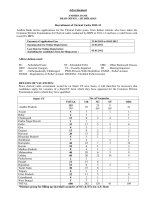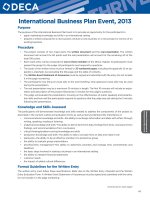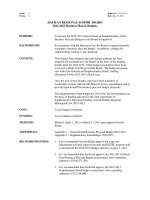VEHICLE CERTIFICATION AGENCY - VCA BUSINESS PLAN 2012 - 13 ppt
Bạn đang xem bản rút gọn của tài liệu. Xem và tải ngay bản đầy đủ của tài liệu tại đây (284.63 KB, 20 trang )
VCA Business Plan 2012-13
1
VEHICLE CERTIFICATION AGENCY
VCA BUSINESS PLAN 2012 - 13
Eastgate Office Centre
Eastgate Road
BRISTOL
BS5 6XX
Telephone: 0117 951 5151
Facsimile: 0117 952 4103
Web site: www.dft.gov.uk/vca
e-mail:
Crown copyright 2012
VCA Business Plan 2012-13
2
This page is deliberately left blank
VCA Business Plan 2012-13
3
VCA BUSINESS PLAN 2012 – 13
CONTENTS PAGE NO.
Foreword from the Chief Executive of VCA
Introduction and Summary
Strategic Outcomes
Strategic Direction and Developments
Progression in 2011-12
The European and UK Domestic Regulatory Climate
Evidence and Research
Data and Information Assurance
Estates
Sustainability
Workforce
Diversity
Business Development
Performance Measures 2012-2013
Risks to Achieving the Plan
Glossary
Annex I – Financial and Resourcing Forecasts
4
5
7
8
9
10
11
12
13
13
13
14
14
15
16
17
18
VCA VISION
Delivering a Safe Environment
VCA Business Plan 2012-13
4
FOREWORD FROM THE CHIEF EXECUTIVE OF VCA
Welcome to the Vehicle Certification Agency (VCA) Business Plan for 2012-13. This sets out our
goals and objectives for the year, and builds on the successes of the Agency over the past few
years.
VCA is a service provider to the Automotive Industry, operating in one of the most competitive
and fast moving sectors internationally. Our core Product and Systems certification activities
deliver a unique service to the industry. We plan to build on the demand for our services during
this new financial year by making efficiency improvements, providing better services to our
customers and delivering to the DfT objectives on economic growth, improving road safety and
environmental performance.
The ECWVTA Recast Framework Directive is continuing its roll-out, and VCA is working with
colleagues from DfT and VOSA, and Trade Bodies, to communicate effectively about the impact
on differing categories of vehicles. This is bringing in new customers to VCA, especially in the
UK, assisting the industry to develop and manufacture world class products.
VCA is continuing to invest in new Information Communications Technology (ICT) and operating
systems, to deliver improved efficiencies in the Agency, to deliver a better service to customers
and to improve access to information through e-channels. This requires an upgrade in the
Agency ICT infrastructure, with higher capacity channels and hardware, and will deliver access
internationally to our clients through secure portals.
The work we do for Government, mainly enforcement activities, for BIS, DEFRA and DfT will be
reduced in 2012-13, reflecting the squeeze on Departmental budgets, as part of the Government’s
commitment to tackle the economic deficit. The Agency will continue to seek and deliver
efficiency savings on these programmes to deliver the best outcomes.
Activities for the DfT in the field of the certification of the packaging of Dangerous Goods are
expected to continue at a similar level in 2012-13, and we will be participating in some research
activities in this area with partners, supporting the European Commission to improve the safety of
the transportation of Dangerous Goods.
We will be investing in new services to support the improvement in vehicle safety, like ISO 26262
Functional Safety, recognising the increasing complexity of electronic systems and controls in
vehicles.
The automotive industry is becoming evermore global, and our international presence has been a
key factor in the recent growth of the Agency. The South American markets have developed
rapidly in recent years, and have become a key sector for many of our customers. Therefore the
Agency is planning to establish a local presence in this region.
The quality of our service has underpinned our delivery, and we need to continually invest in
improving our standards.
Our Ministerial outcomes will focus on improving systems, quality of service, and efficiency of
delivery. We will continue to improve value for money and quality for our customers, and systems
and operations for our staff, and thus we are looking forward to another successful year for the
Agency.
Paul Markwick
Chief Executive
VCA Business Plan 2012-13
5
INTRODUCTION AND SUMMARY
• The Vehicle Certification Agency (VCA) is an Executive Agency of the Department for
Transport (DfT), part of the Motoring Services Directorate, comprising the 5 DfT Agencies
responsible for Drivers and Vehicles, through which VCA receives its corporate
Sponsorship.
• VCA takes its policy lead from the DfT centre, and in 2012-13 the main lead will be the
new International Vehicle Standards Division (IVS), part of the Environment and
International Directorate. The policy lead for the Dangerous Goods activities is the
Dangerous Goods Division (DGD). VCA chairs the Vehicle Technology Forum, working
with DfT policy leads, other DfT Agencies and the Chief Scientific Advisors Unit. This
forum shares knowledge, understanding and experience of emerging Vehicle
Technologies.
• As the UK Type Approval Authority for new on and off-road vehicles, systems and
components, VCA is responsible for approving that these have been designed and
constructed to meet internationally agreed standards of safety, security and environmental
protection. As a consequence of this VCA provides data to the public as well as other DfT
Agencies.
• VCA is also the administrator and operator of the scheme for the approval of packages for
the carriage of dangerous goods in the UK. Each mode of transport has its own set of
International Regulations but all use packaging as defined in the United Nations (UN)
recommendations for the transport of dangerous goods. The requirements for approved
packaging are put into effect by separate Statutory Instruments.
• VCA also operates, on behalf of the DfT, Business Innovation and Skills (BIS) and the
Department for Environment, Food and Rural Affairs (DEFRA), as the nominated
enforcement body for a number of Statutory Instruments arising from European directives,
such as gaseous emissions of non road mobile machinery, replacement catalytic
converters, end-of-life vehicles, the noise emissions from equipment designed for outdoor
use, the environmentally friendly disposal of Waste Electrical and Electronic Equipment
(WEEE) and waste batteries and accumulators.
• VCA supports DfT Street Works Division in providing a certification service to local
authorities who wish to implement bus lane and parking enforcement camera systems.
• In addition to statutory work VCA provides a range of Management System Certification
(MSC) services to the automotive industry supporting the ongoing compliance to the Type
Approval requirements and regulations. These allow the automotive industry to
demonstrate that they have the systems in place, not only to ensure the quality of their
products, but also to minimise the impact on the environment from the manufacturing and
design processes.
• The VCA published database of CO
2
emissions from passenger cars underpins the
graduated Vehicle Excise Duty (VED) and Company Car tax schemes. The VCA
“carfueldata” website continues to be popular with consumers, supporting the
Government’s strategic drive towards the reduction in CO
2
emissions. The tools are now
available through the Direct.gov and Business Link platforms
VCA Business Plan 2012-13
6
STRATEGIC OUTCOMES
The purpose of VCA is to deliver DfT policy in respect of new vehicle, systems and components
Product Certification.
The VCA strategic outcomes are described as: -
Improved Road Safety
• By ensuring through vehicle Type Approval schemes, support and information provided to
manufacturers, that new vehicles, systems and components are designed and
manufactured to the appropriate national, European and international road safety
standards.
• By working with DfT and BIS policy colleagues, so that VCA’s operational experience
helps their formulation of future standards and schemes plus developing VCA capabilities
and expertise and exploring the potential safety benefits of emerging automotive
technologies.
• By testing safety critical vehicle systems and components available in the UK marketplace
and the safety of adapted vehicles like Wheelchair Accessible Vehicles for personal use.
• By issuing Vehicle Special Orders (VSOs) to those vehicles that do not fit within the
recognised approval schemes, but can demonstrate adherence to the safety and
environmental requirements of the DfT. Ahead of the London Olympics, it is anticipated
that VCA will issue VSOs to a small number of vehicles supporting the event.
Reduced Impact on Climate Change and the Environment.
• By enforcing European Directives for road vehicles on gaseous emissions and noise.
• By publishing CO
2
and fuel consumption data for cars and vans on Direct.gov and
Business Link web sites to improve awareness.
• By ensuring through vehicle Type Approval schemes systems and components are
designed and consistently manufactured to appropriate environmental protection and
crime prevention standards.
• By ensuring that containers used for carrying dangerous goods conform to international
standards and providing an information service about the standards for industry.
• By enforcement activities including Non Road Mobile Machinery (NRMM) gaseous
emissions standards, noise standards for equipment used outdoors, distributor obligations
under the WEEE legislation, the distributor and producer obligations under the waste
batteries and accumulators legislation, limits on the use of heavy metals in new vehicles
and standards for replacement catalytic converters.
• By providing Environmental Management Systems (e.g. ISO 14001, EMAS) training, 3
rd
party auditing and standards certification services to industry.
Transformed, Customer Focussed, Convenient, e-Enabled Services
• Providing modern and efficient digital services consistent with the DfT channel approach
and the “digital by default” direction of travel set out in the Government’s Spending Review
and re-affirmed in the 2012 Budget Statement.
.
VCA Business Plan 2012-13
7
• By continuing to develop VCA’s understanding of and readiness for the use of computer
simulation in place of physical Type Approval testing, in parallel with the development of
European Union (EU) legislation. Continuing to deliver the forward plan developed from
the VCA/IVS project completed during 2007-08. Support IVS in the development of UK
policy on this subject.
• By improving access for automotive and component manufacturers to VCA products and
services through its global presence and updating available e-channels on a regular basis
to make available the latest information in a customer friendly manner.
• By the development and implementation of customer accessible web enabled MSC and
Type Approval systems.
• Continuing to support the implementation of the Recast Framework Directive (RFD) for
European Union Whole Vehicle Type Approval (EWVTA). Developing efficient processes
and systems to assist UK manufacturers to obtain approval and delivering Conformity of
Production (CoP) in a cost-effective manner.
Sustained Provision of High Quality, Efficient, Secure Data and Data Systems
• By ensuring that we have well developed and tested business continuity plans.
• By continuing investment in ICT infrastructure,
• By upgrading remote access facilities to provide better access to data while maintaining
data security integrity.
• Ensuring that business processes and systems are regularly audited and improvements
promptly actioned.
Greater Efficiency, Better Value for Money
• By achieving efficiency savings of £150,000, whilst investing in the VCA infrastructure and
skills, through realising the efficiencies generated from the introduction of the new
operating systems including GeMS for MSC, GeAR for Type Approval, and our Case
Management system for Enforcement
• Meeting the financial target as set by the Secretary of State to deliver a £150,000 surplus
on a full cost basis in 2012-13.
• By maintaining our financial performance across all major Type Approval areas and
improving it in MSC in a difficult and uncertain global economic climate so that MSC
operation makes a positive contribution to the Agency financial targets.
• By full engagement in DfT/Government Procurement Service (GPS) in particular car hire,
hotel and other travel costs, and ICT purchases.
• By continuing to increase the productive utilisation of all staff across the Agency, building
on the improvements achieved in the past 5 years, to achieve 68% by 2012-13, from a
baseline of 56% in 2005-06.
• Changes to the structure of VCA’s fee regulations should result in more efficient charging
and use of VCA’s services.
VCA Business Plan 2012-13
8
STRATEGIC DIRECTION AND DEVELOPMENTS
• VCA has made significant progress along the direction established in its 10 Year Business
Vision over the past 7 years, and has delivered the growth and efficiency savings, 3 years
ahead of plan. VCA recently revisited this to reflect the changes in the business
environment, and the learning established to date.
• VCA has increased and maintained revenues through improving customer satisfaction,
delivering new activities as well as offering new regional facilities over the last 5 years in
China, India, Australia and Italy. Changes are underway to improve our organisation in
Korea, and VCA is planning to investigate improving the offering in South America,
supporting the growing needs of the European Industry in this rapidly developing region.
• Following the expansion of VCA into new territories and new core services such as
dangerous goods packaging, the need was identified in 2007-08 to invest in and to
develop an integrated Agency wide management information system. A comprehensive
review of the Agency data needs and operating systems was conducted, and an integrated
programme of improvements was planned. Significant progress has been made and an
implementation plan is currently being produced, the 2012-13 costs of which are included
within this plan.
• With the increasing complexity of electronic systems and controls in vehicles, assurance of
the Functional Safety of these systems is becoming more important. The international
standard, ISO 26262 is designed to give assurance, and VCA is developing expertise in
this area to support the drive for increased safety and compliance.
• Type Approval fees and charges remain unchanged since October 2006, as efficiency and
value for money improvements have been delivered. Changes to VCA’s infrastructure,
particularly in ICT and its resilience, have improved the effectiveness of VCA’s operations
and further improved customer service,
• VCA will continue to develop new tools and techniques to train its staff in the EWVTA RFD.
VCA will also progress the development of new systems and tools to assist existing and
new manufacturers in compliance with the revised Type Approval requirements.
Development of the Compliant Management Service (CMS) will continue and will include a
‘customer portal’ to allow on-line access to data.
• We will continue to develop and improve MSC’s Global e-Management System (GeMS)
and TAMS, to improve cost, quality and delivery across the VCA international offices.
• VCA plans to increase its understanding of developing sciences and technologies. In all
our work – product certification, systems certification and enforcement, as customers
expect VCA staff to be at the forefront of knowledge in their subject for both established
and prospective technologies.
VCA Business Plan 2012-13
9
PROGRESSION IN 2011-12
VCA has made considerable progress in a number of key areas towards its strategic direction and
outcomes, the highlights being:-
• VCA China continues to grow, delivering a significant contribution to revenues. Additional
local engineers have been recruited and are training to ensure we are ready for further
anticipated growth as Chinese car makers seek approval to EU requirements as part of an
expected export push into Europe during 2012-13.
• VCA Italy continues to grow, delivering an important contribution to our European
operations.
• VCA India has continued to nurture new clients within a culture where long term
relationships are so important, setting the foundations to provide certification services as
the automotive industry pushes into exports. This is beginning to reap benefits as the
client base starts to grow with particular success in the component sector such as lamps,
mirrors and tyres. Local engineers have now reached a level where they are making a
positive contribution.
• As in previous years VCA hosted a very successful Dangerous Goods Conference in the
West Midlands, supported by DfT Dangerous Goods Division, related approval and
enforcement bodies which was well attended by representatives of the industry.
• Since its launch in October 2010, the CMS tool is helping to facilitate effective
management of the Type Approval process by manufacturers, especially SMEs affected by
the RFD. The product provides a robust mechanism to support compliance with regulatory
requirements. Continued investment is required to build the functionality for global
applications.
VCA Business Plan 2012-13
10
THE EUROPEAN AND UK DOMESTIC REGULATORY CLIMATE
Developments in European (EU) and international (UN) legislation are expected to continue at
unreduced pace during 2012-13, with EU legislation increasingly calling up UN legislation for
technical requirements.
• Mandatory EU “whole vehicle” type approval (EWVTA) will apply from the following dates:
Existing Types of category M1 special purpose
vehicles
29 April 2012
Existing Types of incomplete and complete vehicles
of category N2, N3, 01, 02, 03, 04
29 October 2012
New Types of Special Purpose Vehicles N1, N2, N3,
M2, M3, O1, O2, O3 & O4
29 October 2012
New Types of category N2, N3 completed vehicles
29 October 2012
• The UN is developing an international “whole vehicle” approval scheme, and VCA will
support IVS Division in those discussions
• The EU’s General Safety Regulation 661/2009 will generate several significant changes
to EU Type Approval legislation:
o 50 separate technical Directives will be repealed;
o 61 UN Regulations will be made mandatory for EWVTA;
o New requirements will be introduced for tyre rolling resistance and rolling noise,
tyre pressure monitoring systems, advanced emergency braking systems, gear
shift indicators, electronic stability control systems, lane departure warning
systems.
The EU’s General Safety Regulation took effect on 1 November 2011 with new technical
requirements and implementing measures becoming mandatory thereafter. It was
intended to deliver a simplification of legislation but in practice the Regulation and its
implementing measures are proving to be very complex and difficult to apply. VCA has
taken a leading role in Chairing the Type Approval Authorities Meeting Sub-Group which
is charged with clarifying the practical implementation of the Regulation.
• EU Regulations apply automatically in the UK as a matter of EU law, albeit that the UK
may have to make domestic provision for enforcement or market surveillance.
Conversely, EU Directives need to be transposed to UK domestic law. New EU
legislative measures expected in 2012-13 are:
Directive/Regulation
Subject Matter
BUS, CAR, TRAILER & HGV FRAMEWORK
Annexes I, III, IV, VIII and IX to Directive
2007/46/EC
Adaptation of text for better regulation.
Commission Regulation Masses & Dimensions
Masses & Dimensions
Commission Regulation on Vehicle Noise
Sound Levels
Regulation 715/2007 and 692/2008 Amendments*
Light Duty Emissions
Regulation 595/2011 and 582/2011 Amendments
Heavy Duty Emissions
Draft Regulation on Fuel Economy Meters
General Safety/ Fuel Economy Meters
Commission Regulation GSI
General Safety / Gear Shift Indicators
Commission Regulation mandating UN
Regulations 30, 54, 64 and 117
General Safety / UNECE Regulations
Draft Regulation on LDWS
General Safety / Lane Departure Warning
Systems
Draft Regulation on AEBS
General Safety / Advanced Emergency
Braking Systems
MOTORCYCLE FRAMEWORK
Revised Framework Regulation on Approval and
Revised Motorcycle Framework
VCA Business Plan 2012-13
11
Market Surveillance of two or three wheel vehicles
and quadricycles
Regulation on environmental & propulsion
performance requirements (REPPR)
Revised Motorcycle Framework
implementing measures
Regulation on vehicle functional safety
requirements (RVFSR)
Revised Motorcycle Framework
implementing measures
Regulation on vehicle construction requirements
(RVCR)
Revised Motorcycle Framework
implementing measures
Regulation on administrative requirements (RAR)
Revised Motorcycle Framework
implementing measures
TRACTOR FRAMEWORK
Approval of agricultural and forestry machines
Revised Tractor Framework
3 implementing measure regulations
Revised Tractor Framework implementing
measures
• UN Regulations do not apply automatically under UK law. The status of UN Regulations
changes frequently with many amendments under development that are too numerous to
list in this document.
EVIDENCE AND RESEARCH
• In order to achieve VCA’s goals, robust evidence is needed to inform decision-making in
a number of areas, including customer service, policy, and the use of technology.
• VCA is responsible for its own areas of research and evidence, working with the DfT
policy leads and other stakeholders, such as the Chief Scientific Advisor’s Unit, to plan
activities for research and evidence gathering, to share findings and to implement the
resulting conclusions and decisions.
• In 2012-13 evidence and research will continue to focus on three areas:
• Customer and market research will seek greater understanding of customer needs and
perceptions of the quality of our service.
• Technical knowledge gathering will continue to improve understanding of:
o Virtual Testing (VT). EU legislation allows virtual testing for a limited number of
regulations and directives. VCA is developing procedures, test reports and
training which will allow the Agency to respond knowledgeably, proportionately
and consistently to requests from manufacturers;
o Electronics, telematics, systems safety and sensors. These are being
developed for vehicles and other relevant products. In particular, functional
safety (including ISO26262) and inter system compatibility of electronic and
electromagnetic systems is becoming increasingly important. This will support
Management Systems and Type Approval of electronics based modules,
vehicle systems and complete vehicles.
o Alternative fuels. The types of fuels available or likely to become available are
well known. VCA staff however, will benefit from greater understanding of
production techniques, chemical compositions, emissions, pollution, catalyst
requirements and well-to-wheel carbon effects;
o Alternative powertrains. Complete new powertrains, components and retrofit
items are being developed. These are evolving rapidly as the range of Electric
and Hybrid vehicles expands. They rely on a host of technologies including
power electronics, complex electronic control units, high voltage transmission
systems, static and dynamic recharging to deliver the intended environmental
benefits. VCA must understand the underlying science and any implications for
the Type Approval testing process;
o On-board methods of electricity generation and storage. Batteries, capacitors,
flywheels, energy regeneration systems, energy harvesting and fuel cells are all
VCA Business Plan 2012-13
12
being developed for vehicle applications and non-automotive use. Electricity
generation and storage are one of the key enablers of hybrid vehicles which are
seen as a way to meet the emissions and environmental legislative and societal
challenges.
o Other emerging technologies. VCA will look at the horizon of scientific and
technological research in order to identify science and technology issues that
have relevance to vehicle development. The aim will be to identify, classify and
’roadmap’ new technologies which are either not obviously covered by current
regulations or which will require legislative interpretation, in order to allow VCA
time to develop a measured response to developing technology and to develop
new business areas.
• Knowledge Management (KM). VCA is very keen to engage with other agencies, DfT(c)
and other government departments on the area of KM. VCA sees KM as an enabler for
continuous business improvement and is keen to learn and share in the best practice
available within government. VCA will develop mechanisms to capture assess and share
its knowledge. It will also continue to work with the agencies and the rest of DfT on
Knowledge management activities.
DATA AND INFORMATION ASSURANCE
• VCA operates in a Business to Business environment mainly with the automotive industry.
As such the Agency does not hold or process personal data in respect of the general
public. Some data held on VCA’s ICT network and laptops of Type Approval engineers
could be classed as commercially sensitive. All staff handling this data are required to sign
a confidentiality agreement on joining VCA. All staff are required to undertake the National
School of Government’s e-learning Protecting Information course at Level 1. Information
Asset Owners and individuals regularly handling personal or sensitive information are
required to complete Level 2 training. To protect against the potential loss of this data
through loss or theft of laptops, VCA encrypts the hard discs of all laptops to the UK
National Technical Authority on Information Assurance (CESG) approved standards.
• VCA is committed to the recommendations of the Cabinet Office review of data handling.
The Agency has appointed at board level a Senior Information Risk Owner (SIRO). The
SIRO is responsible for both business and information risk and has the role to support
actions to improve the level of information assurance including risk assessment and risk
management throughout the Agency.
• VCA has identified all information assets, and appointed owners. The information asset
owners are responsible for implementing the recommendations of the data handling review
and are required to review their risks quarterly and provide written assurance reports to the
Agency SIRO annually.
VCA Business Plan 2012-13
13
ESTATES
VCA leases its headquarters building in Bristol, land at the Motor Industry Research
Association site for the Midlands Testing Centre and an office for the Dangerous Goods
activities in Leatherhead, adjacent to testing facilities. The overseas offices are all leased.
There are no rent reviews or lease renewals due in 2012-13. The lease on our
headquarters in Bristol expires in 2015 and we will be analysing the options for relocation
from the Eastgate centre and delivering a strategy by March 2013.
• A significant upgrade of our Midland Centre accommodation has just commenced,
replacing an aging prefabricated building and boiler system which are no longer fit for
purpose. Replacing a poorly insulated building with a modern and efficient office set-up,
plus training facility, will allow further expansion of the Midland Centre and will reduce our
carbon emissions and running costs, contributing to our Greening Government
commitments.
SUSTAINABILITY
• VCA is fully engaged in DfT’s commitment to Sustainable Development (SD) and makes a
valuable contribution to the delivery of the Department’s strategy. Some key examples are:
o Collating and publishing information (colour coded environment labels) on the fuel
consumption and emissions of new and used vehicles;
o Testing new vehicles to ensure they meet the appropriate noise and emissions
standards;
o Enforcing requirements concerning the gaseous emissions of non road mobile
machinery;
o Enforcing requirements for the performance of replacement catalytic converters;
o Enforcing limits on the use of heavy metals in new vehicles;
o Enforcing the Waste Batteries and WEEE directives to reduce the environmental
impact of portable batteries, electrical and electronic equipment when they reach the
end of life; and
o Developing knowledge of sustainable vehicle emission technology developments and
sharing this knowledge across the Department.
The Agency’s SD Action Plan covers, amongst other things, targets for reducing carbon emissions
from offices, ICT, office equipment, road vehicles, waste and water consumption. We will be
reviewing our sustainability strategy to ensure it meshes with the DfT Property Sustainability
Strategy and our Greening Government commitments and reviewing our action plan. We are
currently on target to achieve a 25% saving in greenhouse gas estate emissions by March 2015.
VCA has established an active SD Focus Group which raises awareness of SD issues within the
Agency and plays a lead role in taking forward initiatives.
WORKFORCE
• VCA plans to increase the staffing level during 2012-13, reflecting the increasing demand
for our services, with revenues planned to increase from £14 million in the last Business
Plan to £15.5 million in this new Financial Year, an increase of over 10%. This, together
with an average annual staff turnover of 5%, means we will need to recruit approximately
22 staff during 2012-13. Recruitment is likely to cover a mix of grades and specialist skills,
including support services; the largest requirement is expected to be in specialist technical
professionals. As at 1 March 2012, VCA has 9 unfilled vacancies and recruitment
campaigns are currently underway for 8 of these. The remaining vacancy, in Central
Services, is likely to be carried forward to 2012-13. Note that should there be a significant
VCA Business Plan 2012-13
14
increase in workload due to client demand, then VCA will need to review staffing levels
accordingly.
DIVERSITY
• VCA values and utilises the potential and strengths of all staff in the Agency by treating
people as individuals, embracing variety, rejecting prejudice and accommodating changes
in working patterns. VCA believes that using a flexible people management approach
motivates staff and creates an environment that enables all members of the Agency to be
productive. Key aspects are as follows:
o VCA’s published Single Equality scheme 2010-12, which is built around the
following key themes:
Leadership and accountability,
Behaviour and culture,
Talent management,
Representation,
Mainstreaming equality and diversity in the business;
o All staff within the Agency attend core diversity and bullying and harassment
awareness courses as part of VCA’s induction training plus refresher courses
where appropriate;
o Agency policies and processes are subject to Equality Impact Assessments; and
o Staff views are sought through regular staff surveys, and it was pleasing that
following the recent Civil Service wide survey in Autumn 2011 the Agency recorded
a Staff Engagement score of 69%, maintaining our place in the Civil Service high
performing sector, in the top 7 of all surveyed organisations.
BUSINESS DEVELOPMENT
VCA’s Business Development will continue to build on its existing customer base, and concentrate
on coordinating business development activities between all VCA offices worldwide. The key
objectives for 2012-13 are aimed at improving sustainability, market intelligence and global
communications, and include the following:
• Secure and develop business with our existing global customer base through continued
support and nurturing of strong working relationships.
• In supporting the DfT implementation project for the EWVTA RFD, ensure that the industry
understands the regulatory demands, particularly with SMEs introduced to the Approval
processes for the first time. Also continue to publicise the key implementation dates, to try
to smooth the demand for services.
• Continue to build on the Type Approval business in emerging markets, such as China,
Asia Pacific, India, Eastern Europe and Latin America. The introduction of EWVTA for
buses is recognised as being a key element in the expansion of certification work from
these regions, where many of the major manufacturers are existing VCA clients.
• Continue to develop and promote CMS as a tool to facilitate effective management of the
Type Approval process by manufacturers especially helping SMEs affected by the RFD.
• 2012-13 proposals for VCA Enforcement activities include:
o Non-Road Mobile Machinery Enforcement;
o Safety critical vehicle systems and components in the UK
marketplace;
o Replacement Catalysts;
VCA Business Plan 2012-13
15
o Provision of fuel consumption and CO
2
information in promotional
literature;
o Tyre Noise; and
o Tyre labelling
o WEEE/Batteries and Accumulators
VCA PERFORMANCE MEASURES 2012-2013
The VCA key performance targets are agreed by the Secretary of State and support those of the
DfT.
VCA Specific Measures
Category
Measure Objective
Operational
Deliver the agreed testing and enforcement
programmes.
31 March 2013
System & component approval certificates issued within
9 working days of completing technical clearance.
92%
Conduct a technical audit of system and component
approval test reports.
1% of VCA test
reports.
2% of external
Technical Service
test reports.
Audited test reports deemed to have no critical defects, a
critical defect being one that would cause the approval to
be likely to be rejected, legitimately, by a receiving
Approval Authority or one that renders the approval
invalid such that it should be withdrawn.
99%
Ensure the continued consistency and quality of VCA’s
approvals by undertaking the following programmes:
•
New type approval clients that do not hold
ISO9001 or ISO/TS16949 management systems
certification to be subject to a Conformity of
Production assessment, in accordance with the
agreed risk-based app
roach, before approval
issue.
• Dangerous Goods packaging -
Carry out a
programme of Conformity
inspections in
accordance with the Service Level Agreement
agreed with the Department.
100%
31 March 2013
Maintain or improve the satisfaction of our customers for
our services.
90%
To meet three out of three of the following Customer
Service Measures at a minimum of 85%.
• We provide our customers with information that is
clear, accurate and complete
• Our staff are polite and friendly to customers at all
times and understand customer needs
• We make information about the full range of
services we provide available to our customers
3 out of 3 at 85%
Cut carbon emissions from agency buildings and
business use of vehicles by 31 March 2013, compared to
15% at 31 March
2013
VCA Business Plan 2012-13
16
a 2009/10 baseline
Financial
Ensure efficient deployment of staff within business plan
complement set for 31 March 2012
Ensure the number of working days lost due to sickness
absence does not exceed.
196 FTE’s
5.0 days
Agency finance –
Make efficiency savings as part of a wider and continuing
savings programme.
£150k
Deliver financial performance in line with Business Plan.
£150k surplus
MSC back into breakeven on a full cost basis.
Break-even
Measures applicable to all Motoring Agencies
Category
Measure
Objective
Operational
Payment of invoices within 5 working days.
80%
FOIs Provide response within 20 working days
93%
PQs Provide response within due date
85%
MPs’ correspondence Provide response within 7 working
days
85%
Official correspondence Provide response within 20
working days
80%
RISKS TO ACHIEVING THE PLAN
• The VCA market sector is susceptible to commercial changes, business and economic
cycles and exchange rate fluctuations. The global automotive industry is evolving and
highly competitive. Some overseas territories currently operate outside the World Trade
Organisation rules and guidelines, placing additional competitive pressures and
uncertainty on the industry.
• VCA costs and revenues are subject to exchange rate fluctuations, which can have a short
term impact on the financial performance of the Agency. VCA is unable to mitigate this by
hedging, but does manage the flow of cash to and from overseas locations and by
matching local spend with local income whenever possible to minimise this risk.
• Exchange rate impact on annual accounts – at the 31 March each year debtors, creditors
and cash balances are translated into sterling at the exchange rate on that day. Any
movement between this and the prior year’s valuation due to a movement in exchange
rates gives rise to a loss or gain.
• Loss of key personnel and timely recruitment, particularly with the demand in the UK for
experienced automotive engineering professionals, and the consequent wage inflation.
• VCA’s control and risk management is continuously improving to counter the risks inherent
in the financial forecasts. The VCA Audit Committee chaired by a Non-Executive director
reviews the risks identified by the Agency regularly and reports on the governance
process.
VCA Business Plan 2012-13
17
VCA Business Plan 2012-13
18
GLOSSARY
BIS Department for Business Innovation and Skills
CESG UK National Technical Authority on Information Assurance
CIO Chief Information Officer
CMS Compliance Management System
CoP Conformity of Production
CRM Customer Relationship Management
DEFRA Department for Environment, Food and Rural Affairs
DfT Department for Transport
DGD Department for Transport – Dangerous Goods Division
EMS Environmental Management Systems
EU European Union
EWVTA European Union Whole Vehicle Type Approval
ELV End of Life Vehicles Regulations 2003 and 2005
FTE’s Full Time Equivalents
GeAR Global – Approval Register
GeMS Global e- Management System
GPS Government Procurement Service
IAO Information Asset Owner
ICT Information and Communications Technology
IVA Individual Vehicle Approval
KSI Road Killed and Seriously Injured
M1 Vehicles designed and constructed for the carriage of passengers and comprising
no more than eight seats in addition to the driver’s seat.
M2 Vehicles designed and constructed for the carriage of passengers, comprising
more than eight seats in addition to the driver’s seat, and having a maximum mass
not exceeding 5 tonnes e.g. Minibuses
M3 Vehicles designed and constructed for the carriage of passengers, comprising
more than eight seats in addition to the driver’s seat, and having a maximum mass
exceeding 5 tonnes e.g. Coaches.
MSC Management Systems Certification
N1 Vehicles designed and constructed for the carriage of goods and having a
maximum mass not exceeding 3.5tonnes
N2 Vehicles designed and constructed for the carriage of goods and having a
maximum mass exceeding 3.5 tonnes but not exceeding 12 tonnes
N3 Vehicles designed and constructed for the carriage of goods and having a
maximum mass exceeding 12 tonnes
NRMM Non Road Mobile Machinery
O1 Trailers with a maximum mass not exceeding 0.75 tonnes
O2 Trailers with a maximum mass exceeding 0.75 tonnes but not exceeding 3.5
tonnes
O3 Trailers with a maximum mass exceeding 3.5 tonnes but not exceeding 10 tonnes
O4 Trailers with a maximum mass exceeding 10 tonnes
OGC Office of Government Commerce
QMS Quality Management Systems
RFD Recast Framework Directive (for European Union Whole Vehicle Type Approval)
SD Sustainable Development
SIRO Senior Information Risk Officer
SMEs Small and Medium Sized Enterprises
TA Type Approval
TAMS VCA Type Approval Management System.
IVS Department for Transport –
International Vehicle Standards Division
UN United Nations
UNECE United Nations Economic Commission for Europe
UNESCO United Nations Economic and Social Committee
VED Vehicle Excise Duty
VOSA Vehicle and Operator Services Agency
VSO Vehicle Special Orders under the Road Traffic Act 1988 Section 44
VT Virtual Testing
WEEE Waste Electrical and Electronic Equipment









